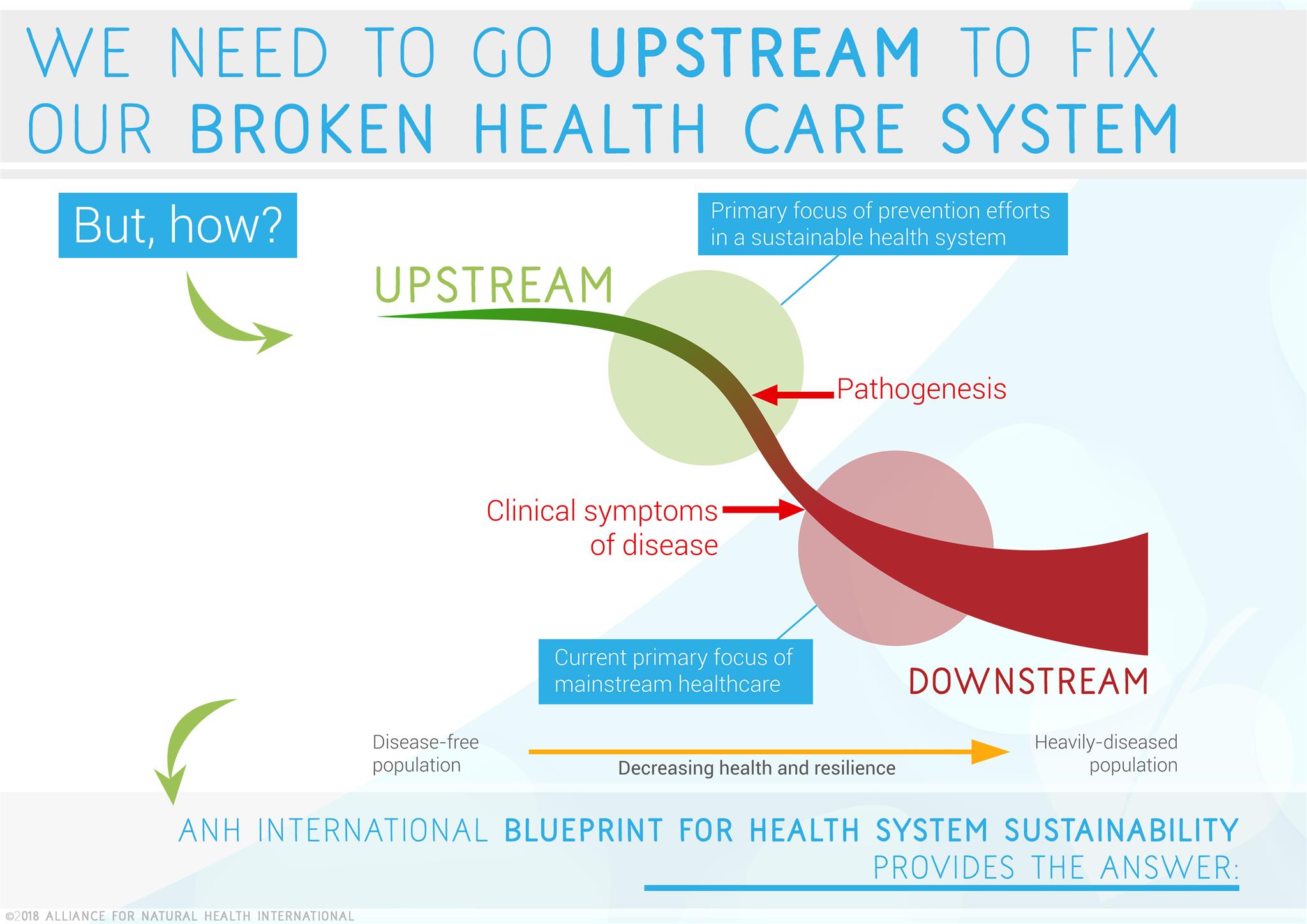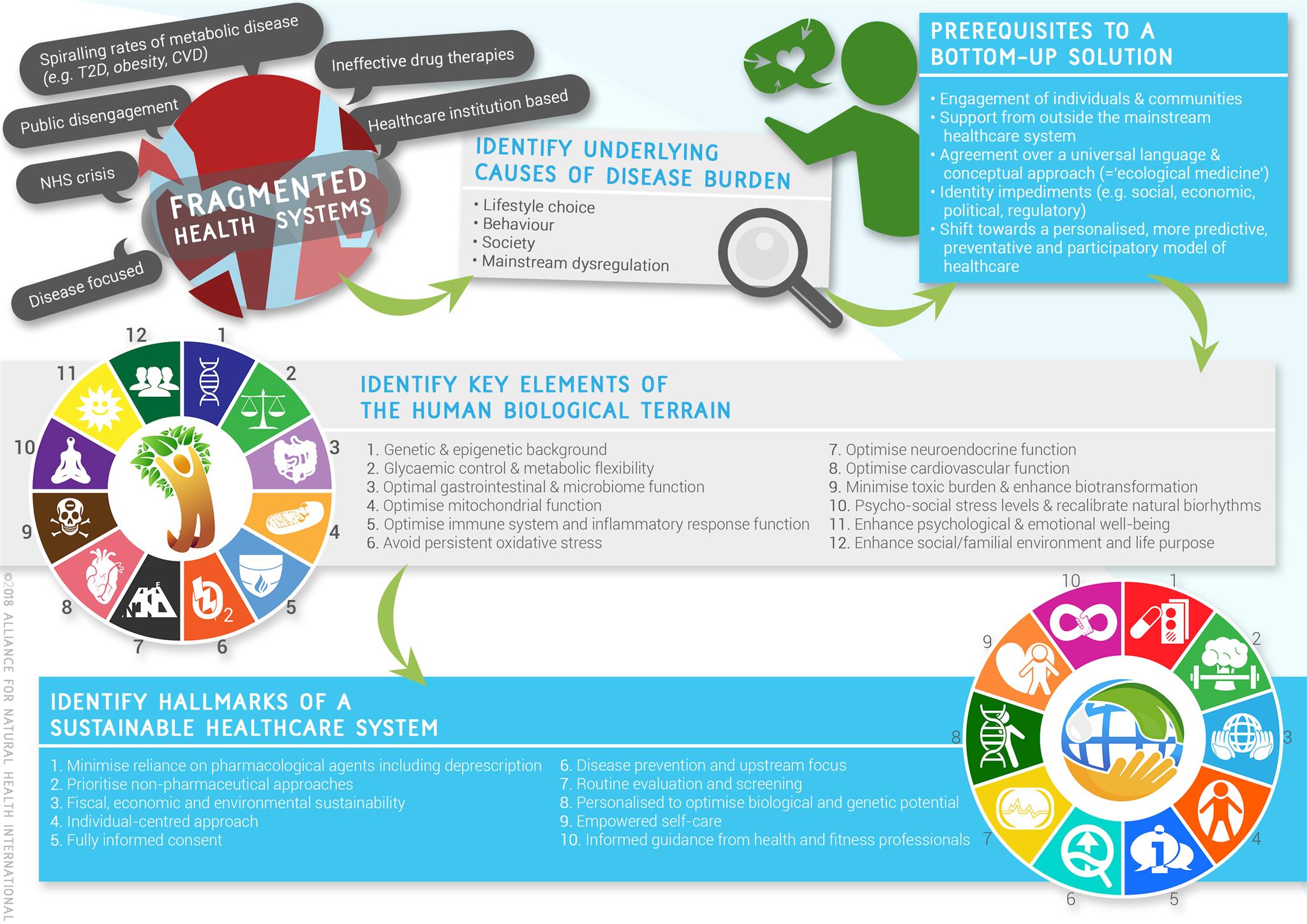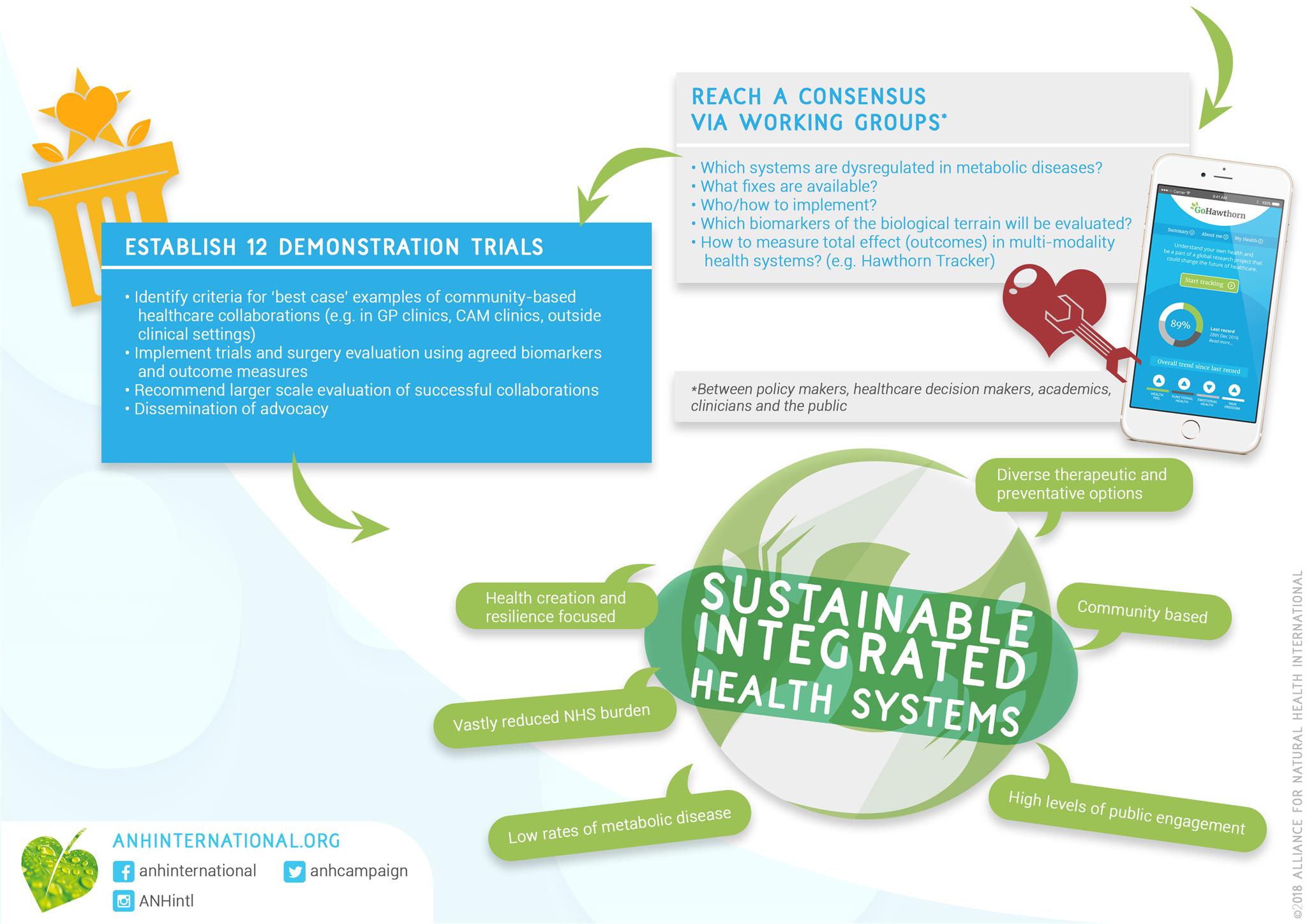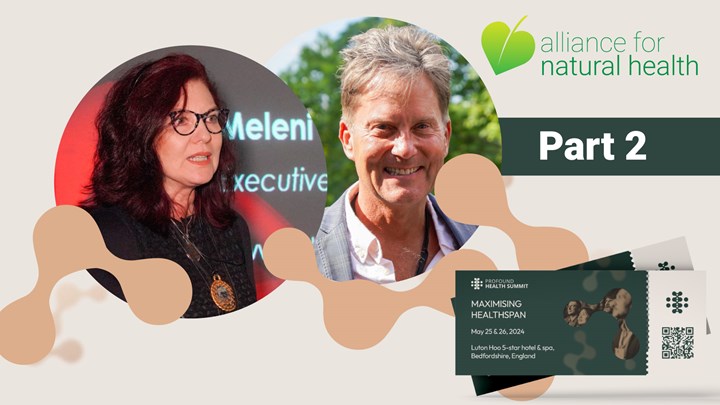Content Sections
It was February this year in Kuala Lumpur, Malaysia, that our founder Robert Verkerk PhD first gave a sneak preview of what was to be expected in our ‘sustainability blueprint’ to be released in final form next month.
We’ve now opened the door further to the ideas and concepts, taking it to some of the leaders in the field of integrative and functional medicine in the USA – and discussing it for the first time on radio. Key to us finding the right way of delivering via the media for the first time was finding a kindred spirit who understood the multiple reasons why such a sea change was needed. That means understanding the complex political, economic and social issues that have led to the dominance of pharmaceutical approaches in allopathic medicine – as well as to the sidelining of a plethora of non-pharmaceutical approaches that work with, rather than against, nature.
We can’t think of someone more fitting to take the information and concepts contained in our blueprint to the American people than Robert Scott Bell.

Robert Scott Bell DA Hom – host of the Robert Scott Bell show, homeopathic practitioner and passionate campaigner for natural health and health freedom
Below you’ll find the podcast, recorded last Sunday, in which Robert interviews Robert. If you have the available time, we think you’ll find it a very worthwhile listen – because it pulls out some of the most important elements of our blueprint in a form that makes it very accessible. The accessibility is aided further by the hosts’ manifest excitement as they grabble with the scale and potential impact of the project!
The launch of our completed, post-consultation, widely endorsed sustainability blueprint is now only a month away.
As we take the ideas within the blueprint around the world, we’re coming to understand that we need to explain it on different ways for different people. In this light, we provide you below 3 different formats to help you understand more about our blueprint: audio, text – and graphic.
ANH-Intl sustainability blueprint in a podcast
"The Robert Scott Bell Show Sunday June 10 2018 Hour 2" from The Robert Scott Bell Show Sunday June 10 2018 Hour 2 by Robert Scott Bell. Released: 2018. Genre: Talk.
Download and listen to podcast of Robert Scott Bell interviewing Rob Verkerk PhD about our ‘blueprint’ on health system sustainability [interview starts 2.30 min in]. (Recorded on Sunday, 10 June 2018)
ANH-Intl sustainability blueprint in 10 points
For those who don’t have the time to listen to the podcast – following are some of the most salient points. (For those who have don’t have the time to either listen to the podcast or read the following, there’s an infographic below!)
- The existing system is broken. The mainstream healthcare system is actually largely a ‘name it, tame it with a pill’ delivery system for goods and services linked to the pharmaceutical industry. The system doesn’t work well for the majority of people afflicted with the most common diseases of the 21st century, notably obesity, type 2 diabetes, cancer, heart disease, osteoporosis, dementia, Alzheimer’s disease and over 100 autoimmune diseases. The model proposed in our blueprint is not about trying to fix the mainstream healthcare model - it is about co-creating a parallel, bottom-up model. The over-arching aim isn’t to create a parallel model that has the capacity to reduce the burden on mainstream medicine that is both over-burdened by a plethora of chronic and autoimmune diseases generated by inappropriate diets and lifestyles, while at the same time being amply set up for delivering acute medicine to the public.
- Co-creation and consensus are key. If we don’t try to co-create a parallel system that is built on consensus we will continue to fight a battle between opposing views, in the process causing proponents from each side to become ever more entrenched. Approaches that work with rather than against nature and that don’t involve patented technologies will continue to be left in the ‘long grass’ by the medical establishment.
- Bottom-up, not top-down. Consensus doesn’t need to be limited to existing decision-makers at the top of governments and industries that currently control healthcare. Their vested interests or blinkered approaches simply keep the pharmaceutical-dominated, disease-focused model on track, irrespective of its lack of effectiveness for many, especially chronic and autoimmune conditions. Most revolutions start bottom-up not top-down – and our blueprint is very much about change being driven from the bottom up.
- Creating a common language. We also believe that to get consensus we need to develop and agree common principles that can be applied across different healthcare modalities and groups of people – healthcare professionals and the public alike. It’s about developing a common language. The language we use is based around ecology and systems biology, given that it is hard to deny that human beings are biological organisms that are entirely dependent on the environment around them. The lens through which we look at ‘healthcare’ is one that takes full account of sustainability – given the allopathic model is unsustainable.
- A sustainable system is built around the individual, not the provider. The system, being bottom up, is built around the individual, not healthcare providers, healthcare professionals or the industries that service them. It seeks to inform and empower the individual so s/he is able to take responsibility for the decisions that affect health and resilience. It supports choice in healthcare – and ‘health system’ is redefined as the complex of interactions around a given individual that affect health, for better or for worse. The health system with which an individual engages needs to be both participatory and collaborative, and is far from confined to clinics and hospitals, being just, if not more, relevant in homes, schools, workplaces and community centres.
- The sustainability ‘keycard’. We provide a 10-point entry ‘keycard’ for those wanting to engage with a sustainable health system – these being referred to as hallmarks of health system sustainability. They include non-reliance on pharmaceuticals, prioritisation of multi-modality non-pharmaceutical approaches, fully informed consent, focus on prevention and upstream root causes of disease, empowered self-care and guidance by a collaboration of health and fitness professionals.
- The 12-zone biological terrain. We delineate a 12-element terrain map for the individual, encompassing key areas of physiological, psychological and social function. The system is particularly applicable to modalities of medicine or health care that work with, rather than against, nature. It’s inclusive, not exclusive. We refer to these 12 elements or zones as the ‘biological terrain’ and each zone in the map represents areas that have been amply demonstrated to be of seminal importance to health and resilience. Rather than focusing on disease or disease symptom treatment, the focus, via self-care, guided healthcare and/or practitioner-mediated interventions, is getting each of these elements into balance. A biological terrain that has 12 systems in balance is one that doesn’t manifest much in the way of disease. It also doesn’t need a medical doctor to diagnose disease before anything is done to correct a dysfunctional physiology, emotional state, social system – or whatever else might be triggering or mediating pre-clinical or manifest disease. The individual is empowered by knowing which zone or zones need attention in a prioritised manner. He or she is so enabled to work through self-care or a range of different health and fitness professionals to help bring specific zones into balance, gaining feedback along the way using one or more of the three levels of evaluation.
- Three levels of evaluation to enhance empowerment and engagement. We’ve identified ways by which each zone in the terrain can be evaluated at three different levels: by individuals themselves without support from health or other professionals (self-evaluation), by individuals with the support of professionals (guided evaluation), or specifically by health professionals using specific markers or biomarkers (practitioner evaluation).
- Working groups for refinement, adaptation and consensus. We are proposing the establishment of working groups with representation both from the allopathic and the integrative, non-conventional medical world, that help refine the system and adapt it to specific situations and circumstances using consensus-based approach. The co-creation on both sides is likely to increase engagement, implementation and adoption.
- Demonstration trials – the acid test. We are endeavouring to establish 12 demonstration trials in the UK alone, so that this fully engaged, participatory and collaborative sustainable health model can be evaluated in a variety of different settings. We are seeking to publish outcomes as measured using our biological terrain model.
If it all works and goes to plan – we’re confident a co-created revolution in how health is managed by those who choose to work outside a pharmaceutically-dominated system will be in the making.
ANH-Intl sustainability blueprint in an infographic
And, finally, for those who’re more visual, here is a representation of our blueprint – in graphical form….










Comments
your voice counts
13 June 2018 at 10:06 pm
The word Sustainability is an unfortunate choice, given that it is the basic term used in Agenda 21 thru the U.N. While I understand that you all use it differently, many health freedom and liberty advocates, especially in the U.S., will be confused about it until they learn the difference. So I suggest that when this word is used, it needs to be accompanied with further word(s) such as Health Freedom Sustainability to differentiate it from the U.N. Sustainability (GMO's, Common Core, Mandatory Vaccinations, and the like).
14 June 2018 at 11:50 am
Many thanks for your comment. We appreciate that in the US there may be confusion over the use of the term sustainability when applied to health care, but in many other parts of the world, including the UK, the term is taken (when applied to healthcare) to refer to a system that is able to be sustained over long periods of time. As you’ll no doubt agree, side effects, lack of effectiveness of drugs for many chronic and autoimmune conditions and high costs, all contribute to a lack of sustainability of the present pharmaceutical-dominated, allopathic system. However, we are very open to using terminology that encourages adoption and will reconsider terminology and language assuming there is interest in testing/evaluation in the US. Right now our top priority is the pilots in the UK where the use of the sustainability concept has helped not hindered wider understanding of the approach.
Kind Regards
Rob Verkerk PhD
13 September 2018 at 6:52 pm
I think it is both brilliant and essential that the sustainable healthcare campaign is introduced to the population. However, I have been so shocked recently to discover the serious damage that sweeteners cause to the human body, e.g. Aspartame, Sucralose, Sucrose to name just three and how the effects can result in obesity and neurological problems. I wonder if named sweeteners will be included in your any of your presentations? It is no co-incidence that Monsanto have a vested interested in these sweet poisons, namely Aspartame. I am firmly of the opinion that many people desire to be slimmer than they are, try really hard to be healthy but fail. You have written at times about the damage a low fat/no fat diet does to the body, but that message seems very slow to reach the general population as they also receive a 'diet' of mixed news and messages from the media. I really hope that your campaign redresses the balance, is very successful, and it is not before time.
17 September 2018 at 8:26 am
Hi Jo
Thanks for sharing your thoughts. We have discussed the problems associated with non-nutritive sweeteners many times and will continue to do so. There is a growing awareness of the beneficial effects that dietary changes can make, but as you say there is still confusion due to the mixed messages given by the media (something that we discussed in this recent article https://anhinternational.org/2018/08/29/the-collapsing-edifice-of-nutritional-science/).
We will continue to campaign for the changes to government dietary advice that are so badly needed in order to improve public health and reduce the pressure on collapsing healthcare systems around the world.
Thank you for your support.
Warm Regards
Melissa
Your voice counts
We welcome your comments and are very interested in your point of view, but we ask that you keep them relevant to the article, that they be civil and without commercial links. All comments are moderated prior to being published. We reserve the right to edit or not publish comments that we consider abusive or offensive.
There is extra content here from a third party provider. You will be unable to see this content unless you agree to allow Content Cookies. Cookie Preferences